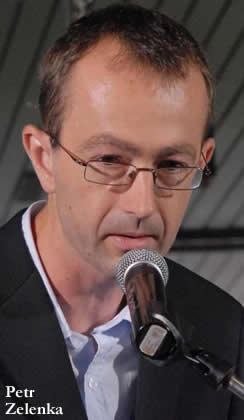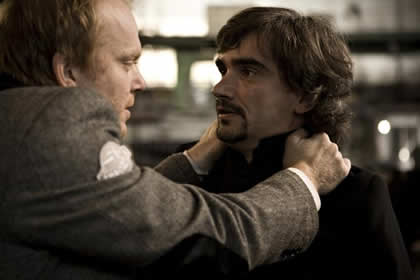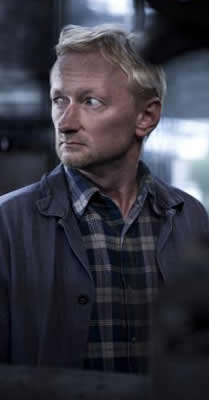On a hot summer day in Poland, a group of people walks through a run-down steel mill. They are actors, from a theater in Prague, and they’re here to rehearse for a performance to be held in the space the next day. There are a few workers still on the job at this mill, the only living creatures left. They pay the actors little attention at first, pre-occupied with a personal tragedy: the day before, the son of a maintenance-man fell from a catwalk and seriously injured his spine. Their interest is in his fate. Amid remnants of old machinery and old junk, the rehearsal begins. It is an adaptation of Fyodor Dostoevsky’s “The Brothers Karamazov“, specifically concerned with the trial for the murder of Old Karamazov. All the while they are rehearsing, the “real world” of the workers remains at the edges of the performance, the tragedy they’re experiencing striking similar chords as events within the play, until the two threads become inextricably knotted.
A graduate of the Czech film school FAMU, Petr Zelenka worked initially as a script editor at Barrandov Film Studios. In the early 1990’s, he wrote a number of tele-plays for Czech Television. In 1998 his feature film Buttoners (Knoflikari) received a Tiger Award at the International Filmfestival Rotterdam and four Czech Lions (Czech Academy Awards), including Best Screenplay, Best Director and Best Film. 
His next feature directorial effort, Year of the Devil (Rod d’abla), won the Crystal Globe at the 2002 edition of the Karlovy Vary International Film Festival and took home 6 Czech Lions, including Best Director and Best Film. He also is a successful playwright, whose work is translated and produced throughout Europe. His most recent feature, The Karamazovs (Karamazovi) made its international premiere in the official selection, international competition of the 43rd Karlovy Vary International Film Festival (July 2008), where it was awarded a Jury Special Mention and the FIPRESCI award.
Bijan Tehrani: This film is based on a play, and when I was watching the film, it feels distinctly made for cinema. How did you manage to transition a play into a film so well?
Petr Zelenka: I think it was out of desperation because we were quite desperate. I wrote the script based on the play, and it was like one hundred pages of pure dialogue. The camera operator said ‘How are we going to film this? It is just people talking?’ And I said maybe we have to give the dialogue another meaning, we have to make the dialogue sexy. So we came up with the right format, and we tried to incorporate the set stage as much as possible. And I think mainly, the actors are very good and the wide format screen allows you to see not only the talking faces, but also what is going on in the second and third row behind the actors; I think that is the secret.
BT: I have not seen the play on stage, but to see this on film gives it another level of depth, particularly how you bring the audience into the story.
PZ: There is a tradition of theater on television in the Czech Republic. What they do is simply record tape or film a play in the theater, and it is very simple, and it never works. I was inspired in a negative sense by this, and knew that I had to incorporate the viewer in it. If you are just watching a staged play on film, you loose like 90 percent of what there is. From the very start I was sure that the audience had to be part of the story.
BT: The location is really great for this film. It is a cold and black location that really fits the plot. How did you come up with the idea for this location?
PZ: Well, the first idea was a shipyard in Northern Poland. But we realized it was not available, and was not very sexy. Someone then had an idea to do it in the steelworks, and I went to see them in Krakow, Poland, and I fell in love with it. But we faked that, it is not filmed on that location. It is filmed in a smaller steelwork location in the Czech Republic. But it fits Dostoevsky, somehow.
 BT: You introduced us to some amazing actors in this film. It’s a wonder that there are such great actors existing on this planet. You gave us a great opportunity to watch them work. Did you use the same actors who were in the original play?
BT: You introduced us to some amazing actors in this film. It’s a wonder that there are such great actors existing on this planet. You gave us a great opportunity to watch them work. Did you use the same actors who were in the original play?
PZ: Not exactly. I kept the boys and the family, but I changed the girls because I thought the actresses in the theater were of a different standard. The trick was to let them overact. When you read the textbooks on to how to act, they tell you not to do this. The first chapter is always how not to act the way these actors do in this film. So by going against the rules, it worked, because they have a reason to.
BT: How did you design the visual style of the film? The film is shot in a very clean style. How did you work with the director of photography?
PZ: This is the DP’s third film, and he has worked on loads of advertisements. He is very skilled with filters and gadgets. We used a gadget—a light that shines into the camera, and it allows you to make the dark corners a bit brighter. That gadget let us film so many shades of gray and black.
BT: I found that the characters of the film represented politicians of our time, regardless of what country you are talking about. They ignore the rules and perpetrate crime. Were you conscious of this?
PZ: Well, the main reference that I see is the responsibility of intelligent people.
BT: When making the film did you read the book again?
PZ: Yes, I did. I read it at first when I was sixteen or seventeen, but I did not finish it. I went back to it when I was preparing the film, and read it twice thoroughly. It is a joy to come back when you are older in life. You miss so many levels when you are young.
BT: Is it true that your projects are co-produced with Poland?
PZ: This was the first and only co-production I did with Poland. I did my own stage play last year in Krakow. Generally they like me a lot in Poland, and so it was easy to organize this co-production, because they basically let me have whatever I wanted.
BT: Are you working on anything else currently?
PZ: I am writing a script, but I don’t know if it is going to be filmed because it is pretty complicated.

